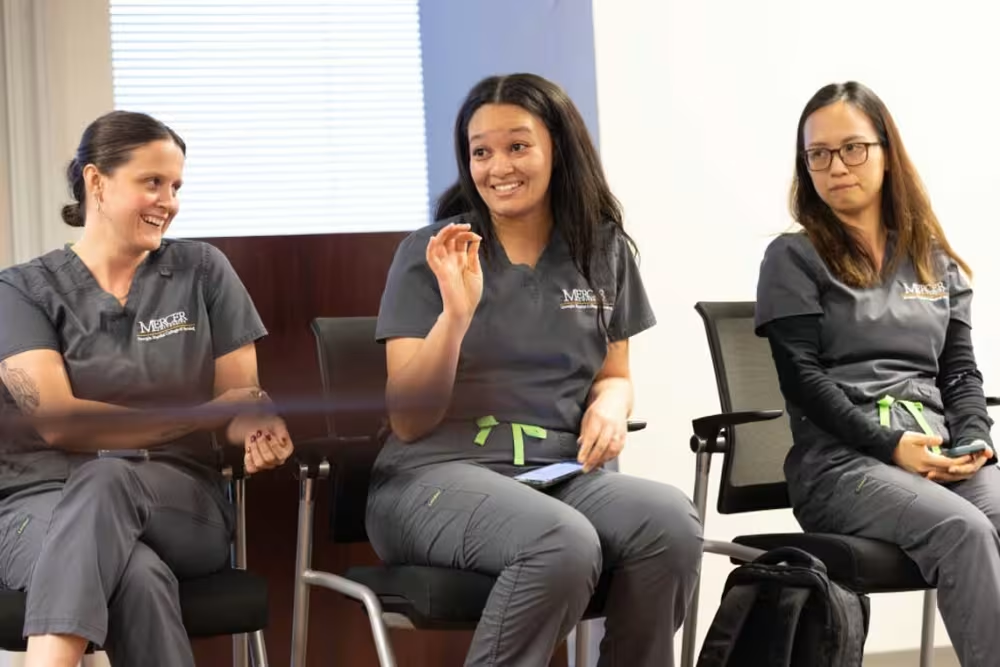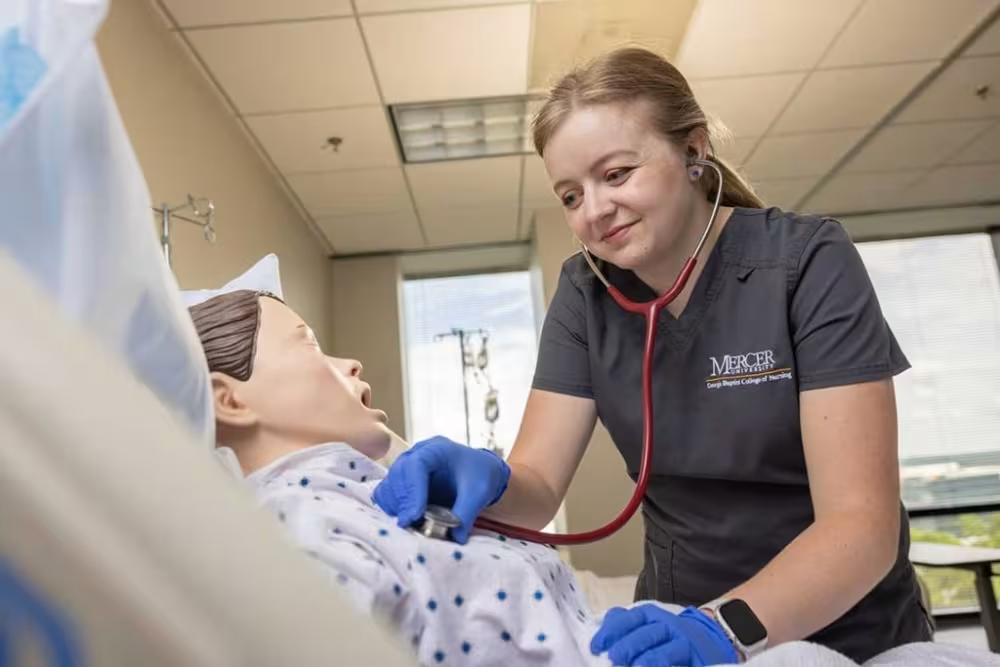What Is Nursing School Like? Everything You Need to Know
Each blog post is dated and contains accurate information as of that date. Certain information may have changed since the blog post publication date. If you would like to confirm the current accuracy of blog information, please visit our ABSN track overview page or contact admissions at 844.347.2108.
Nursing school is the first step to becoming a nurse, but what is nursing school like? How does it work? How packed is the schedule? How fast can it be done? Mercer ABSN will help you get the full picture on what to expect and how to prepare.

Becoming a nurse is a journey toward a lifesaving and rewarding career that typically begins with completing nursing school, but what does that process look like? There are about 4.8 million registered nurses in the U.S., and while individual experiences might differ, most nursing schools share common elements. These key components provide a foundation for students, no matter where they learn, to develop the knowledge and skills needed to succeed in the field.
For those who are considering returning to school to become a nurse and wondering “What is nursing school like as a second-degree student?” you may find an answer with Mercer University. Mercer offers a 12-month Second Degree Accelerated Bachelor of Science in Nursing (ABSN) track specifically for students who have a previous a non-nursing bachelor’s degree.
Based in Atlanta, Georgia, this intensive three-semester ABSN track builds upon your previous education so you can focus on your nursing studies and enter the nursing field more quickly. Whether you are starting fresh or changing careers, it is never too late to pursue a nursing career.
How Does Nursing School Work?
If you are wondering how nursing school works, you are in the right place. While each nursing program has its unique qualities, they all cover essential areas including:
- Foundational courses
- Nursing skills and simulation labs
- Skills training
- Clinical rotations
- Research
- Assessments
The length of time to complete nursing school can vary depending on the individual, but a traditional Bachelor of Science in Nursing degree typically takes about four years to complete. If you have already earned a non-nursing bachelor’s degree, Mercer University’s Accelerated BSN track provides a great way to transition into nursing in a shorter timeframe.

Overview of the ABSN Track Structure
Mercer University’s ABSN track in Atlanta is an intensive, three-semester pathway designed to be completed in as few as 12 months, not including any necessary prerequisites.
While core nursing knowledge and theory courses are delivered online, you will benefit from experienced instructors genuinely invested in your success. They provide support and guidance to ensure you not only understand the material but also feel confident in applying it. This blend of flexibility and hands-on learning makes it an ideal choice for those eager to advance their nursing careers sooner.
Want to earn a nursing degree in as few as 12 months? See Mercer’s ABSN curriculum.
What to Expect in Nursing School
Nursing school is a challenging yet fulfilling experience, and as a student, you will be preparing to become a healthcare professional through a combination of online coursework, hands-on training, and real-world clinical experience. It will not always be easy, but you will build the skills and knowledge needed for your career as you progress.
Online Coursework
In an accelerated nursing track like Mercer’s, you will start with online coursework that covers essential nursing concepts. These classes will introduce you to important subjects like anatomy, pharmacology, and pathophysiology. Along with these foundational topics, you will study healthcare ethics, patient care, and nursing leadership. Your learning will involve a variety of methods, including textbook readings and interactive case studies, all designed to help you grasp both the theoretical and practice aspects of nursing.
Hands-On Training in Skills and Simulation Labs
Next, you will get hands-on in the skills and simulation labs. This is where you will practice things like taking vitals, conducting assessments, and giving injections. You will also use high-fidelity medical manikins to practice more advanced nursing tasks like intubations. The skills and simulation labs provide a space to practice in a controlled environment before you are out in the field.
In the simulation labs, you will work in a realistic hospital-like setting where you will interact with people acting as patients and high-fidelity manikins that can talk and display a variety of behaviors and symptoms. These experiences are designed to develop and test your critical thinking skills and provide you the opportunity to encounter medical situations you might not during your clinical rotations.

Clinical Rotations and Real-World Experience
The real-world experience of clinical rotations is where you will gain additional experience and apply your training. During rotations, you will move from observing to providing care, with your actions being supervised by experienced nurses and clinical educators. You will inevitably face challenges along the way, but each interaction is a learning opportunity that helps you become more confident and capable in real-world situations.
These rotations will give you valuable experience and allow you to explore different specialties to help shape your nursing career.
What Is It Like to Be in Nursing School?
You may have heard that nursing school is challenging. The accelerated format of Mercer’s ABSN track can be rigorous, but what is it really like on a day-to-day basis?
The Day-to-Day Experience
The pressure of nursing school can be significant. Not only are you balancing classes, but it is a time-intensive curriculum that is designed to be completed in as little as one calendar year. That means a lot of your time and energy will be dedicated to it. Many students say that they are committing 40+ hours a week to studying and coursework.
Support Systems for Success
If you are considering Mercer’s 12-month Accelerated BSN track, you might wonder “How hard is nursing school?” A truth that you will encounter throughout your first semester and beyond is that nursing school requires plenty of study and application. That said, it is possible to succeed with a supportive learning atmosphere and effort in your studies.
You will stay connected with your instructors and classmates through built-in chat and discussion features in the online coursework, as well as in-person labs and clinical rotations. Many students also find success by forming study groups with their peers. These groups offer a great opportunity to bond over the challenges of nursing school while working together toward future goals.
Challenges and Rewards of Nursing School
Nursing school presents its own set of challenges. It is like running a marathon: There are tough moments along the way, but finishing that race leaves you with a sense of accomplishment. The key is finding ways to stay strong and keep going, knowing that the benefits of a nursing career are worth the effort.

Overcoming Academic and Emotional Challenges
Like any marathon, preparation is essential for ensuring success. Nursing students often have their strategies to manage stress and emotional challenges that come with the workload.
Creating a routine can be beneficial. For example, setting aside specific times each week to read or study helps you stay ahead of the curve. Organizing your schedule helps avoid last-minute cramming sessions. Not only will you be studying when your brain is fresh, but you will also feel more productive and in control.
Just as important as an academic routine is taking care of your body. Make time for daily walks, morning yoga, or an afternoon run to decompress. Giving your body the proper food, sleep, and exercise it needs can make a huge difference in your energy levels and overall well-being.
The Rewarding Outcome
Nursing provides a sense of fulfillment and opportunity to serve and give back to the community. Helping patients and lifting them up when they need it the most is purposeful and meaningful work. In addition, nurses are fairly compensated for their hard work. Job security in nursing is another benefit, offering stability that many other careers cannot match.

See why Georgia is the perfect place to start your journey.
Ready to Earn Your Nursing Degree in as Little as 12 Months?
After reviewing what nursing school is like, take the next step on your educational journey to go back to school to become a nurse. Mercer University’s 12-month Accelerated BSN track offers three start dates throughout the year, so you can start classes as soon as you are ready. Give us a call today to learn more, or complete the form to have an enrollment counselor reach out to you.
